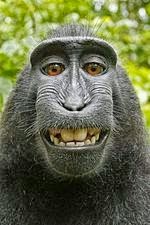 |
| Alas: not much too laugh about copyright-wise |
The poll ended yesterday and received 354 responses [thanks so much to all those who took the time to vote!].
The results are well summarised here, but for the sake of completeness, here's what our readers think:
- "The monkey owns the copyright: she's the author, after all". This is true for just 24 readers (6%).
- "Only humans are authors so the photographer owns the copyright as the nearest relevant human", say 107 readers (30%).
- "There is no copyright in works authored by animals: they are a gift to humanity which we can all use". This is not just the opinion of the US Copyright Office [see §306], but also of 187 readers (52%).
- "The United Nations should set up a special agency to own and control uses of all non-human works like this", is the ambitious suggestion of 16 voters (4%).
- "Whichever human gets to it first can keep it, just like any other bona vacantia" is the opinion of 20 readers (5%).
In any other field of endeavor it is sufficient to spend time and money on a project for it to belong to the person who decides to spend that time and effort. Get some planks of wood and make a garden shed and its yours. It doesn't matter if your design is unoriginal and you use plans which thousands of others have used before it is still yours. Save up the money to buy a car and you can decide to have exclusive use of it. If a thief took it you would call the police straight away. You didn't do anything creative or original to own the car but society at large recognises your rights to it. It makes no difference if you pay a carpenter to make your garden shed, its still yours.
ReplyDeleteJust what is it about photography that the world thinks we put in effort and expense and they can steal it?
@Bob Croxford.
ReplyDeleteYou are confusing title in the physical object with copyright. I grant you that both are property rights but they operate differently and are governed by different parts of the legal system. If someone steals your car, you can rely on the Theft Act in support of your right to regain possession. However if you wanted to operate your car as a taxi, mere ownership would not suffice; you would need some sort of additional licence to economically exploit your car in this way. Much the same would apply if you wished to turn your garden shed into a pub.
Nobody (as far as I am aware) is disputing that Mr Slater owns the photograph; it's just the additional rights of exploitation afforded by copyright which appear to elude him.
ReplyDeleteWhat if the photographer had deliberately set up a situation in which a playful monkey was lured into pressing the button, so as to get a reward -a banana ?- Would that change the situation?
I would have expected your readers to be better informed. If they bother to look at SSn 187 and 12(7) of the UK's CDPA 1988 it is singularly obvious that a work does not have to have a human author.
ReplyDelete@Richard McD Bridge.
ReplyDeleteI suspect that many readers of this blog are indeed well informed about the CDPA. If you are making the point that works can be generated by computer, then rather than citing a section which deals with duration, a more relevant section might be s 9(3), concerning authorship, which says: "(3) In the case of a literary, dramatic, musical or artistic work which is computer-generated, the author shall be taken to be the person by whom the arrangements necessary for the creation of the work are undertaken." In other words there is a human involved.
The problem with applying that yardstick to the monkey pictures is that, in Mr Slater's version of events he had not intended the monkey to run off with the camera and take random shots - many of which were unusable due to the monkey's lack of skill as a photographer.
And anyway it is not necessary to invoke the provisions for computer-generated works, in order to bring into play the concept of works being authored by the person who makes the arrangements for something to be created, rather than the operative who presses the shutter etc. This is already explicit in s 9(2) in relation to sound recordings, films and broadcasts.
I cannot see any relevance in your reference to s 187, which since it lies within Part II - Rights in Performances, it is not applicable to copyright.